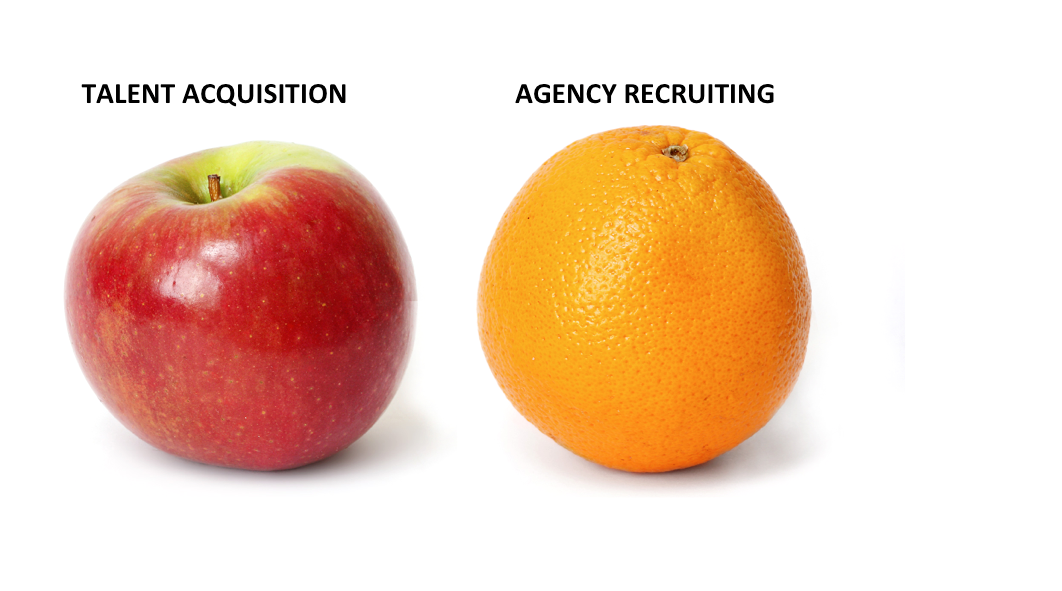
Proven recruiting takeaways from corporate and agency life
NOTE: Audience in-mind for this is (1) recruiters, or prospective recruiters, and (2) anyone who’s worked with a recruiter as a candidate or hiring manager/client.
First of all, I am extremely passionate about what I do – I love being a recruiter. If I won the lottery and didn’t have to work ever again, yes, I’d still be involved with it. Having seen both sides of recruiting (agency/firm-side and in-house, corporate “talent acquisition”) on a couple occasions, I thought I’d reflect upon and share what I’ve learned and how it’s shaped me.

CORPORATE TALENT ACQUISITION: 2 THINGS I’VE LEARNED
Project Management: Hands-down, project management is my key takeaway from corporate recruiting, especially having served within large multi-billion dollar corporations. Throughout the lifecycle of a ‘requisition,’ meaning one job (for which a corporate recruiter typically has 20-40 open simultaneously and solely attached to their name and their individual workload), I’d find myself working with: my assigned HRBP or division HR Manager, my recruiting coordinator, the hiring manager, the hiring manager’s selected interview panel participants, and the 30 to 200+ applicants and candidates over the course of the months that job was open. In addition, probably with 30% of my open jobs, that list and circle of interface was bigger, extending to comp & benefits, in-house sourcing specialists, legal counsel, assessment firms and other outside firms, and corporate communications. What the heck was going on when I interfaced with all those groups of people to drive the recruiting process for that one job? Following OFCCP and EEOC protocol in job posting and candidate communications, lots of market compensation and internal equity discussion, internal process and timeline development, approvals of all sorts, fielding inquiries from employee applicants, kickoff and status meetings, candidate sourcing calls, interviews, travel coordination, wrap-up and debriefing meetings, opening and closing-out the reqs in the system (again, according to strict federal compliance), putting out unexpected fires through in-person meetings, phone calls, emails, conference calls and video sessions across the country and across the world.
Every day, I’d log into the system and look at my open jobs (i.e. my project workload). Each one took anywhere from 45 to 180+ days to close, and my KPIs were to complete each project (i.e. fill each job) with a well-fitting hire for my client (i.e. the hiring manager), and do so on-time, as-planned, and within budget . . . working across many different groups of stakeholders and participants in the process. That’s project management, is it not? (Now whenever I have a Project Manager job to fill, I have a strong sense of respect for those folks)!
Quality Focus: If you work in a firm, you occasionally will recruit your own internal teammates when your firm has an open seat. But for the most part, you recruit employees into other companies. When you hire your own teammates on a fulltime basis on the talent acquisition side, you gain a newfound ownership in the quality of recruiting work that you do and the cultural fit of each hire. It’s hard to explain, but it’s profound.
WHAT I LIKED:
- Working with your recruits. Seeing them lead meetings and saying hello in the hallways. Observing them flourish and knowing you were a part of it.
- The variety and the action. Firm-side recruiting can be repetitive. Days are seldom the same in corporate recruiting. I was also passionate about the previous brands that I served as a corporate recruiter, and that was exciting and fulfilling. If you feel good about ‘drinking the Cool-Aid’ a bit, then it’s really fun (especially if you’re a campus recruiter).
- Client partnership. Corporate clients have urgent, mission-critical needs just like anyone else. But it’s typically a warmer client-to-recruiter relationship. I was trusted as an internal peer and an expert. I was their first go-to resource instead of that ‘last resort no one wants to engage unless they absolutely must.’ I’m my hiring client’s best friend at the end, but it was still nice to begin our relationship with, “Hello Ben! I’m excited that you’re helping me on this!” That ain’t always what you hear from new clients on the agency side. Usually it’s: “Grrr . . . (grumble grumble with arms-folded), I suppose you’re the best option we have at this point. Let’s move forward, and you better get me some candidates by the end of the month!” (Okay, that might be a bit harsh, and I get it: you don’t know me yet so I need to win you over).
WHAT’S A CHALLENGE
- Things tend to move slower in corporate. And your days are generally more administrative in nature. If you love sales, sourcing on a regular basis, and in-person interaction with candidates, you probably align more with agency recruiting.

RECRUITING FIRMS: 2 THINGS I’VE LEARNED
Work Ethic: You’re summoned, you deliver. If you don’t, you’re gone, and it’s your own fault. I learned how to become a proven problem-solver in the clutch, and how doing so is both a long-term process of pipeline-building combined with in-the-moment expertise (i.e. sourcing and delivering for your clients).
Sales: While I learned marketing in corporate recruiting, I learned sales in agency life. I make a living from meeting strangers (many of whom are marketing professionals & become key hires at my company clients), having enjoyable and relatable conversation out of the blue, and turning that into genuine, value-added relationships for them and me. Yet, these aren’t interactions for the faint of heart. You become involved with peoples’ careers – into which they pour their time, money, families, hearts and souls – and you deal with what I would argue is one of the most critical and challenging forms of B2B sales that exists on this planet. I’m not saying insurance, telecom or real estate sales is a walk in the park, but try candidate sourcing and especially the B2B side of recruiting (particularly if you focus on perm placement of middle management roles). However, the impact of your successes upon the stakeholders involved – those being you; the candidate whose career and daily life you improve; and the company whose critical problem you solve by facilitating a good hire – is a feeling of fulfillment and adrenaline that’s unmatched. That’s what keeps me churning and adding value in a tough sales environment.
WHAT I LIKE:
- The responsibility and pressure (and money associated with it…when it comes in). Recruiting is a high-margin business, and appropriately so. We’re not providing company t-shirts, advertising or office supplies here. We’re putting the absolute most important, mission-critical, walking-talking-doers into a business. An organization is nothing without its people, and recruiting is an extremely complex process involving sales, psychology, precise communication and human interaction, and high-stakes, federally-regulated industry expertise. We recruiters are compensated well for delivering (and we fall harshly and it’s a quick exit from the industry and a devastating blow to our income if we fail). I like converting my clients from a colder, “We need Ben and he’s our last resort…” to a warmer, “We want Ben because he simply has the best people…”
- Candidate interaction. I find that I talk with candidates & prospective candidates more broadly being in a firm, and I really enjoy that. It’s not just “Thanks for your interest. What makes you want to work here at [COMPANY]?” In a firm, I find myself saying, “Looks like we’re in the same industry…tell me about yourself…what’s your general situation these days? Oh cool, we both work in marketing and went to Italy recently! Say, if you were to make a career move, whenever that may be, what would it be for, specifically? That makes total sense: I suggest that we talk next week. I have an upcoming opportunity that, based on what you’ve said, is likely something you’ll at least want to know about. I’ll see you at the [industry event] next week, and I’ll be sure to check out that [Italian restaurant] you mentioned!” Because search firm recruiting is less about job volume and trying to cram-in 20 interviews per week, I can take slightly more time to enjoy peoples’ stories and get to know my passive candidates (which ultimately results in better matches).
WHAT’S A CHALLENGE:
- Unfortunately we “permanent placement” recruiters can’t hire too many people. The former teacher in me is one reason why I like recruiting – I thrive on helping people. In my boutique firm, I’d estimate I can only directly help about 1% of job seekers who proactively come to me. Seriously, that’s it. If 100 marketers send me their resume saying, “I’m looking for a new job…” chances are that 1 (maybe 2) will match my openings at some point. Will I try to be an ally for them? Of course. But I’m laser-focused on filling the extremely challenging, select jobs I’m being paid to fill throughout the year. When I was in corporate recruiting, I could at least say, “You know, there are two similar jobs open within our X and Y divisions, you can apply to those as well. I know the recruiters so I can give them a heads-up. Plus, we’ll be hiring around 600-800 people this year; register in our database and you might find something soon!”
I could easily expand and add to these categories and lists, and could talk for hours and days about this subject. For the sake of this article and its length, I’ll stop here. Any follow up questions or comments, please share or just send me an email.
If you’re thinking that this background in corporate TA and search firms is an advantage for me . . . you’re 100% correct. It is one of the keys to 4Sight Search’s success and exceptional fill and retention rates. I love this stuff!
EMPLOYERS: Sign up for our free employer newsletter & talent view here.
MARKETERS: Sign up for our free talent newsletter here.


